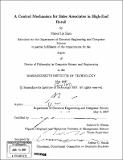| dc.contributor.advisor | Gabriel R. Bitran. | en_US |
| dc.contributor.author | Sam, Shiou Lin, 1976- | en_US |
| dc.contributor.other | Massachusetts Institute of Technology. Dept. of Electrical Engineering and Computer Science. | en_US |
| dc.date.accessioned | 2008-02-27T22:40:10Z | |
| dc.date.available | 2008-02-27T22:40:10Z | |
| dc.date.copyright | 2007 | en_US |
| dc.date.issued | 2007 | en_US |
| dc.identifier.uri | http://hdl.handle.net/1721.1/40508 | |
| dc.description | Thesis (Ph. D.)--Massachusetts Institute of Technology, Dept. of Electrical Engineering and Computer Science, 2007. | en_US |
| dc.description | Includes bibliographical references (p. 121-123). | en_US |
| dc.description.abstract | The strength of the high-end retail industry has traditionally been in marketing and branding while management and operational efficiency lagged behind. In the face of changing client demographics and increased competition, improving operations through better data management and utilization could prove promising. In this work, we attempt to do so by focusing on a neglected area in high-end retail - management of the sales associates. Our first finding is the existence of a disconnect between the data collected and the data required for better control of the associates. Recognizing the gap, we sidestep it by tapping the knowledge of many experienced sales associates through field work. This knowledge is then funneled back to assist in modeling client behavior. The dynamics between an associate and his clients are modeled using an evolution model with stochastic client behavior. We show that under certain conditions, the optimal policy for an associate is a quasi-concave policy. In addition, we provide a methodology that would enable the associates to capture the full potential of a client while at the same time, allow management to reduce the variability in customer service within the store. The computational results indicate that such a mechanism, when compared to the commonly practiced policies, can achieve a substantial lift in revenue generated. In addition, the results also provide managerial insights and expose some common misconceptions. | en_US |
| dc.description.statementofresponsibility | by Shiou Lin Sam. | en_US |
| dc.format.extent | 123 p. | en_US |
| dc.language.iso | eng | en_US |
| dc.publisher | Massachusetts Institute of Technology | en_US |
| dc.rights | M.I.T. theses are protected by copyright. They may be viewed from this source for any purpose, but reproduction or distribution in any format is prohibited without written permission. See provided URL for inquiries about permission. | en_US |
| dc.rights.uri | http://dspace.mit.edu/handle/1721.1/7582 | |
| dc.subject | Electrical Engineering and Computer Science. | en_US |
| dc.title | A control mechanism for sales associates in high-end retail | en_US |
| dc.type | Thesis | en_US |
| dc.description.degree | Ph.D. | en_US |
| dc.contributor.department | Massachusetts Institute of Technology. Department of Electrical Engineering and Computer Science | |
| dc.identifier.oclc | 191869594 | en_US |
